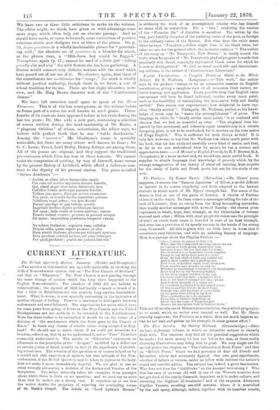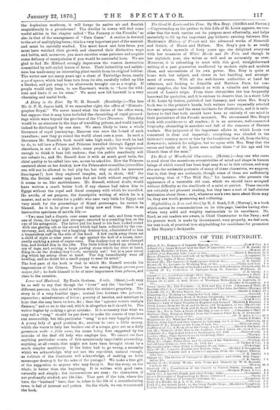The Fern Garden. By Shirley Hibbard. (Groombridge.)—.Here we have a
pleasant volume in which an attractive subject is cleverly- dealt with. The amateur may find all the practical suggestions which he needs ; the more money ho has the better for him, or these really charming illustrations may bring him to grief. We may single out for special praise the chapter on " The Cultivation of Rock Ferns," and that on "British Ferns," where wo find portraits of dear old friends and favourites, nicely and accurately figured. Our own past experiences, whether of failure or success, make us follow with interest the author's sound and sensible advice. The subject has, indeed, a great fascination. Who does not love the " Goldilocks " on the decayed tree-stump ? Who that has seen it on some old wall in one of our Western counties does not get fond of the sturdy Caterach, impatient as it is under culture, and resenting the slightest ill-treatment ? and of the exquisite Adiantum. Capillus Veneris, recalling sea-cliff caverns, where it is nourished by the salt spray, although, indeed, together with its humbler cousin,, the Asplenium marinum, it will forego its native air and flourish magnificently in a greenhouse? The dweller in towns will find some useful advice in the chapter called " The Fernery at the Fireside," as also in that of the management of "Fern Cases." A section is devoted to the art of multiplying ferns ; this is a very important part of the manual, and must be carefully studied. You must know and love ferns, you must have watched their growth and observed their distinctive ways and habits, and, moreover, you must exercise some patience and acquire some delicacy of manipulation if you would be successful here. We are glad to find Mr. Hibbard strongly deprecates the wanton destruction committed by self-styled lovers of ferns. Their imbecillity and selfish- ness has made many an interesting plant vanish from its original habitat. The writer saw not many years ago a sheet of Tunbridge ferns, nearly a yard square, which had been torn from its site, carefully rolled up like a blanket, and put away to be afterwards brought out as a trophy. If people would only learn, to use Emerson's words, to "Love the wild- rose and leave it on its stem." We must now bid farewell to a very charming and useful book.



































 Previous page
Previous page